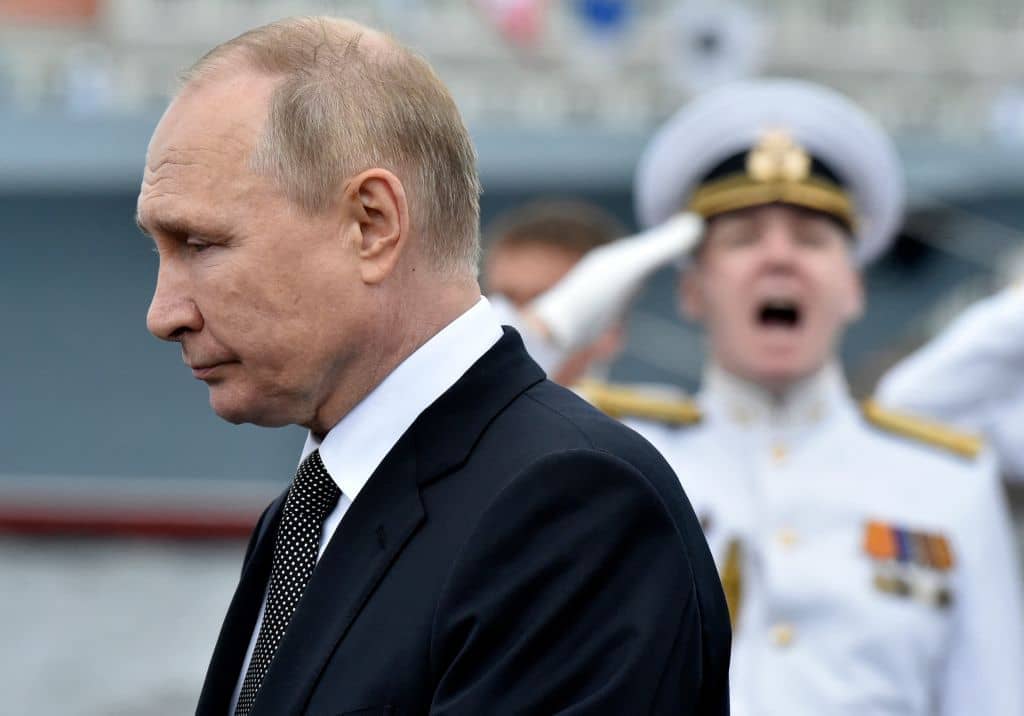Russia is once again relying on ‘General Winter’. Instead of freezing German advances on Moscow, the plan today is to freeze German pensioners in Berlin. Western sanctions are crippling the Russian economy, driving up inflation and unemployment. In turn, Russian restrictions on gas are driving energy prices in Europe through the roof. Putin’s gamble is that Russia’s willingness to bear economic hardship is higher than the West’s.
By winter, Europe could find itself in a literal cold war. Russia is currently throttling gas flows through the Nord Stream 1 pipeline, which is operating at just 20 per cent capacity. Restricted supply is driving energy prices up across Europe, while the threat of further disruption has driven European governments to commit to large-scale reductions in gas use. Forecasts from the Swift Centre put the probability of a cut-off at around 30 per cent; not necessarily likely, but too high to be comfortable.
The economic effects of a shutdown would be immediate, as would the political consequences. Without Russian gas, German’s foreign minister Analena Baerbock has suggested, ‘we won’t be able to provide any support for Ukraine at all, because we’ll be busy with popular uprisings’. Across Europe, politicians face the same question: what exactly is the public willing to pay to help Ukraine?
Putin’s gamble is that Russia’s willingness to bear economic hardship is higher than the West’s
We can start in Britain, where popular opinion has been firmly behind arming Kyiv. This support has been relatively cheap: £2.3 billion in military assistance, drawn partly from stockpiles, and £1.5 billion in humanitarian aid. This is pocket change in the context of total government spending, particularly when borrowing means the bill can be spread well into the future.
What’s less clear is how long support for sanctions will last if the gas is shut off. The knock-on effects of the Nord Stream 1 slowdown are already driving up energy prices, with annual bills currently set to reach £3,850 by January – a £2,579 rise year on year. A majority of the population already opposes tighter sanctions on Russia if it means energy prices rise much higher. They barely support keeping our current sanctions in the face of a smaller increase.
Translating these fuzzy sentiments into solid predictions is difficult. It isn’t clear that people have factored in the increases we already know are coming, and it’s always hard to work with what people say their preferences are rather than evidence of their actual behaviour. But the fact that support is already weakening should give politicians pause.
It isn’t hard to see a scenario where Russia finds a pretext to limit supplies to Germany, either by maintaining low flows or under the guise of ‘emergency maintenance’, and implies the repairs could be much quicker if sanctions were loosened. Energy prices across the continent would rise as supplies were redistributed. Politicians would have to make snap decisions about how to support households through the winter, and whether it could be worth lifting some sanctions in exchange for heating homes.
It isn’t obvious what the British public would prefer. They may feel that Ukraine’s conflict fundamentally isn’t their war. They might simply come to the conclusion that they would rather keep warm in the winter. On the other hand, the stubborn streak in the national character – and a dislike of bullies – might result in support for sanctions becoming deeper entrenched.
If so, the question is whether Europe or Russia has the greater willingness to bear pain. In purely numerical terms, the advantage is with the West. Europe faces a burst of inflation, and a small hit to GDP. In Russia, GDP is shrinking 8.5 per cent, unemployment is spiking, and inflation is running at 24 per cent; there is no version of this where the Russian people are better off. Even the much touted strength of the rouble is an illusion: Moscow is still selling gas and oil overseas, but unable to buy imports; the rise in value is an indicator sanctions are working. But in political terms, Russia has more invested in this conflict than Germany or Britain. Approval of Putin is, if anything, higher than it was before the war. Early signs of dissent have been ruthlessly crushed.
The economic war is not in stalemate. The West is probably winning; if Europe holds its course, spring will follow winter, and with it the opportunity to bring other supplies online before the cold returns. Russia will remain sanctioned, its economy shrinking, and supply chains increasingly strained. Even if Ukraine proves unable to hold its ground, possessing something to offer Russia in terms of economic relief will be a valuable bargaining chip in peace talks. The open question is whether it’s one the West is willing to pay for: Ukraine’s fate may rest on whether we are blessed with a mild winter.







Comments